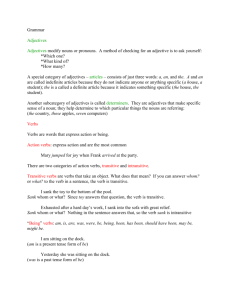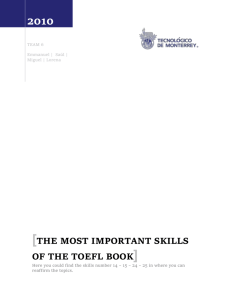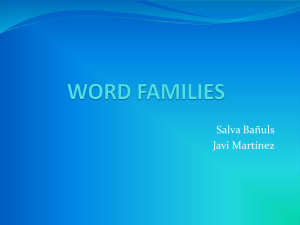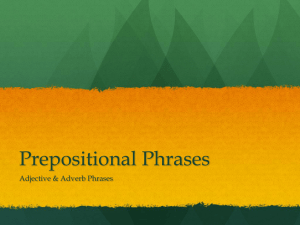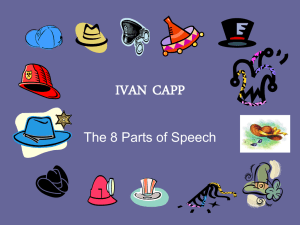Day6 Verbs Adj Adv packet
advertisement
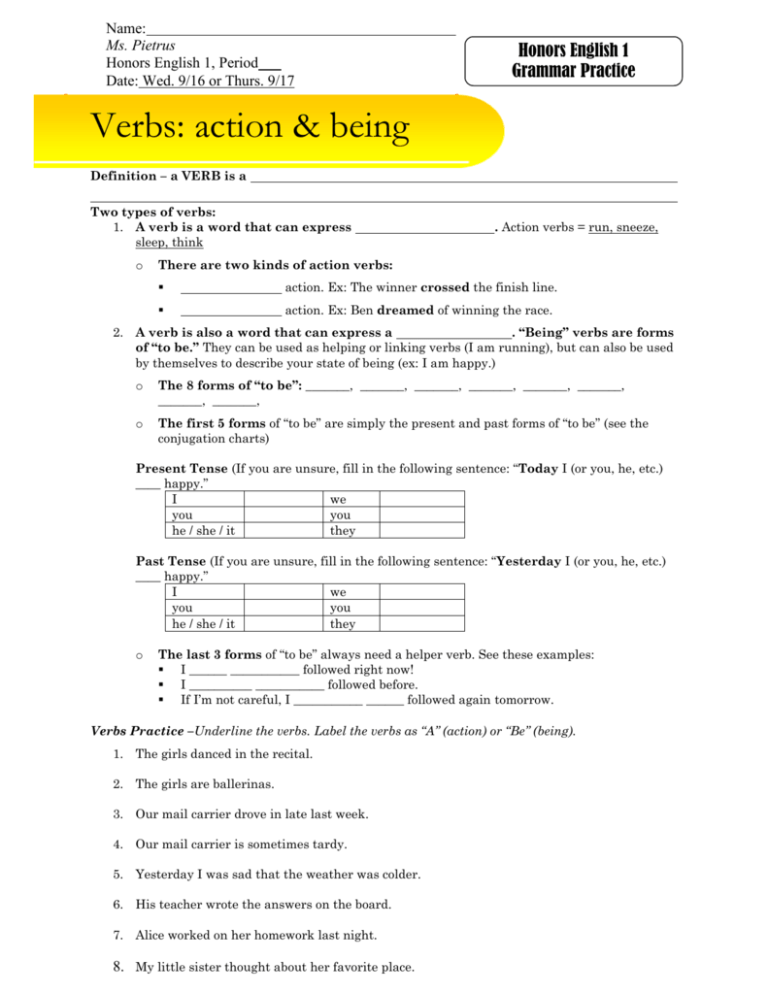
Name: Ms. Pietrus Honors English 1, Period Date: Wed. 9/16 or Thurs. 9/17 Honors English 1 Grammar Practice Verbs: action & being Definition – a VERB is a Two types of verbs: 1. A verb is a word that can express sleep, think o . Action verbs = run, sneeze, There are two kinds of action verbs: action. Ex: The winner crossed the finish line. action. Ex: Ben dreamed of winning the race. 2. A verb is also a word that can express a . “Being” verbs are forms of “to be.” They can be used as helping or linking verbs (I am running), but can also be used by themselves to describe your state of being (ex: I am happy.) o The 8 forms of “to be”: _______, _______, _______, _______, _______, _______, _______, _______, o The first 5 forms of “to be” are simply the present and past forms of “to be” (see the conjugation charts) Present Tense (If you are unsure, fill in the following sentence: “Today I (or you, he, etc.) ____ happy.” I we you you he / she / it they Past Tense (If you are unsure, fill in the following sentence: “Yesterday I (or you, he, etc.) ____ happy.” I we you you he / she / it they o The last 3 forms of “to be” always need a helper verb. See these examples: I ______ ___________ followed right now! I __________ ___________ followed before. If I’m not careful, I ___________ ______ followed again tomorrow. Verbs Practice –Underline the verbs. Label the verbs as “A” (action) or “Be” (being). 1. The girls danced in the recital. 2. The girls are ballerinas. 3. Our mail carrier drove in late last week. 4. Our mail carrier is sometimes tardy. 5. Yesterday I was sad that the weather was colder. 6. His teacher wrote the answers on the board. 7. Alice worked on her homework last night. 8. My little sister thought about her favorite place. Parts of Speech – Adjectives & Adverbs Subject: Adjectives What is an adjective? An adjective ___________________________________________________________. What does it mean to modify? To modify means _____ What does it mean to modify a word? To modify a word means to ___________________ the word or __________________ What questions does an adjective answer? ____________________. _______________________________________________________________ ______. An adjective modifies a noun by answer one of these questions: What ____________? Which ___________? How _____________? What kind? gray sky old shoes clever dog low price _____________ book Which one? that girl next day either way last chance _____________ book How many? five fingers many rivers fewer hours some problems _____________ book Sometimes you will find ______________ used as ____________________________. Can a noun function as an adjective? Nouns crisp bacon blinding snow last December grammar school scary movie favorite holiday Where does an adjective usually appear in a sentence? Nouns Used as Adjectives bacon sandwich snow sculpture December sale school __________________ movie ___________________ holiday __________________ IMPORTANT NOTE: The adjective usually comes___________the noun it modifies. Ms. Farrell tells all students that good workers will be given special privileges. A sweating, exhausted runner crossed the line. Independent Practice – Directions: Write “Adj.” above every adjective in these sentences. Then, draw an arrow from the adjective to the word it modifies. 1. Hector the Collector collected tiny bits of string. 2. He collected dolls with broken heads and rusty bells that would not ring. 3. He collected old chipped vases, brown shoe laces, leaky boats that wouldn’t float, copper keys that fit no locks, and crunchy leaves, and patched-up socks. Subject: Adverbs What is an adverb? An adverb is a word used ________________________________________ _____________________________________________________________ What does it mean to modify? What questions do adverbs answer? To modify means ______ _________________________. Adverbs answer one of these four questions: __________________? __________________? __________________? __________________? This phrase means ______ _________? Where? When? How? -We lived there. -Please step up. -I have the ticket here. -May we go tomorrow? -Water the plant weekly. -We’ll see you later. -She quickly agreed. -The rain fell softly. -Drive carefully. EXAMPLES: afterward, already, now, often, sometimes, then, today, tomorrow, yet EXAMPLES: accidentally, cheerfully, angrily, delightfully, enthusiastically EXAMPLES: back, forth, far, near, here, there, up, down, downstairs, nowhere, somewhere, outside Where does an adverb usually appear in a sentence? To what extent? -I am completely happy. -He hardly moved. -Did she hesitate slightly? EXAMPLES: extremely, just, more, only, quite, rather, really, somewhat, too, very Adverbs may come ___________________ or _________________ the verbs they modify, and they may sometimes ____________________ the parts of a verb phrase. Adverbs may also introduce questions. EXAMPLE: When is the soccer game? Have you ever seen me play? Which verb is the adverb where modifying? Which verb is the adverb ever modifying? Independent Practice – Directions: Write “Adv.” above every adverb in the sentence below. Then, draw an arrow from the adverb to the word it modifies. 1. Tourists in London usually visit the Tower of London. 2. Yesterday, my brother cheerfully made breakfast. 3. The tiger stealthily followed its prey, hoping to make a meal of the wild boar. The boar, sensing its doom, quickly ran away and carefully hid in its burrow.

